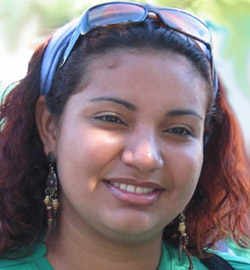Elenira is the
daughter of Chico Mendes, the rubber tapper leader murdered
in 1988. Chico founded the Union of Rural Workers of Xapurí,
he was also a founding member of the Partido dos
Trabalhadores (Workers’ Party), promoter of the “Union of
Forest Peoples,” and president-elect of the National Council
of Seringueiros (rubber tappers), a position which his death
prevented him from occupying. Elenira is the current
coordinator of the Chico Mendes Foundation, and she has
participated actively in the launching of the international
campaign jointly organized by CONTAG and IUF.
|

Elenira Mendes |
-Where is the Chico Mendes Foundation located?
-We are located in Xapurí do Acre, in the state of Acre, the
place where we used to live, where he was murdered, and the
center of his struggle.
-How did your father’s death occur?
-During the 1980’s, state violence in Acre was very strong,
it was an everyday thing. Several social and union leaders
had been murdered in clashes with gunmen hired by the
“fazendeiros” (large landowners). In 1987, concerned that
the construction of the federal highway BR 364, financed by
the IDB, was causing a huge devastation in our state, my
father, Chico Mendes, traveled to the United States to
address that country’s Senate, where he denounced what was
happening in Acre. The immediate result was the suspension
of financing for the highway.
-How did the powerful react to this?
-This triggered a series of public accusations against him,
claiming that he was trying to prevent the state’s
development. From then on, the threats, which were already
common, became constant, continuous. That same year, the UN
awarded him the “Global 500” prize in recognition of his
struggle in defense of the forest. The following year, 1988,
was a very difficult one for him, because he already felt
that his death was nearing. On December 15, 1988 he turned
44. That night he gathered our family –my mother, my brother
and me–, and told us that he feared that that would be the
last birthday we’d share with him. He was certain that the
day of his death wasn’t far away. We were all very sad.
-Did he have any protection, bodyguards?
-They were local policemen, with little preparation for that
task, without proper weapons. They were always at our house.
We lived under a horribly tense atmosphere. On December 22,
he took my brother and I out, and at about 7 p.m. my mother
served dinner. He was playing domino with the two police
custodians and asked for a towel because he wanted to shower
before dinner. The bathroom was outside the house, in the
back, and he went out alone, with the towel over his
shoulder. When he opened the door he was shot on the chest.
The policemen ran and jumped out the window. My father
managed to walk from the kitchen to the bedroom. “I’ve been
hit,” he said, and fell to the floor, fighting against his
approaching death. Mi mother and I tried to help him, he was
trying to speak, but no words came out. I know he tried to
say my name but couldn’t. He died there, in our bedroom.
-What happened later?
-After Chico Mendes’ death the whole world woke up and saw
the violence in that region, they learnt that many people
had died already for the same reasons: defending the forest,
its inhabitants, and the rubber tappers.
-What happened to the murderers?
-They were the two landowner brothers Darly and Darcy Alves,
who have completed their sentence and are now free. But the
repercussions of his assassination drew the eyes of the
entire world to Xapurí. There was much struggle, many
questionings, but all that, together with international
solidarity, led to Chico Mendes’ being the last social
leader to be murdered in the region. He was brave, he
denounced everything that was happening, right up to his
death.
-What do you think of the international campaign against
rural violence?
-This international campaign of IUF and CONTAG is very
important, because, how many mothers have lost their
children? how many widows and orphans are being left by this
violence committed with impunity? In Acre violence has
ended, and I hope that no more blood is shed, but that only
happened when many people around the world became aware of
the violence suffered there. Right now that violence still
exists in rural Brazil, and in some states like Pará it is
escalating. It’s important for all of us to unite, commit
ourselves, realize that directly or indirectly we are
suffering the consequences of that violence. The whole world
must be alert, and we must all join our voices and say: Stop
rural violence! No more fatherless children, no more widows!
No more blood shed on the land and over the land! Let’s
fight for the land that is hoarded by a few people, to
distribute it among the thousands of landless peasants.
Carlos Amorín and Álvaro Santos
© Rel-UITA
May 5, 2006
Volver
a Portada